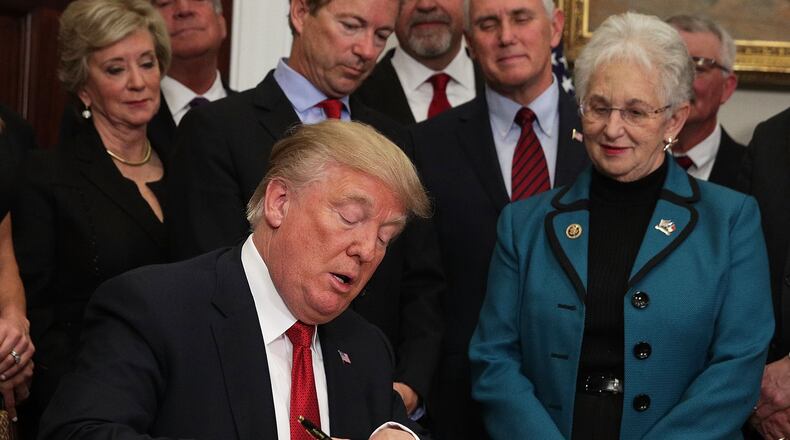President Donald Trump’s move to loosen some of the federal rules governing so-called associated health plans and short-term insurance on Thursday garnered mixed reaction in Georgia.
Republicans lauded the changes for increasing flexibility and competition and providing more lower-cost options to locals with few or no alternatives to Obamacare. Democrats and some health groups, meanwhile, warned it would undermine the Affordable Care Act by luring away young and healthy people while raising insurance premiums on the older, sicker Americans the law was designed to protect.
The changes came in the form of an executive order, which the president signed Thursday morning in the White House’s Roosevelt Room, surrounded by Cabinet officials, lawmakers and health care and business executives.
“This will cost the United States government virtually nothing, and people will have great, great health care,” Trump said.
The executive order directs federal agencies to make three major changes to health care rules:
- Expand access to association health plans, which allow small businesses in the same field nationwide (such as electricians) to band together to buy insurance coverage at better prices, even if the plans are offered in another state.
- Widen the window for short-term insurance coverage from its current three-month limit. Such plans tend to be bare-bones and have high deductibles. They aren't subject to many Obamacare mandates and coverage requirements, including for prescription drugs and mental health benefits, which makes them cheaper. They're often relied upon by people between jobs or with few other health care coverage options.
- Provide incentives for the use of Health Reimbursement Arrangements. HRAs are employer-funded accounts that are used to reimburse employees for out-of-pocket health care costs and premiums.
The moves won early praise from Republicans in Georgia, including Johnny Isakson. The third-term U.S. senator has been a longtime backer of association health plans, and he said Trump’s move was “a good thing.”
“It’s not a be-all, it’s not an end-all,” Isakson told reporters Tuesday about the move to expand association health plans. “But it’s a herculean step forward to get some more affordable health care for people that don’t have any access to it now.”
Other health care stakeholders in Georgia were more cautious.
Ethan James, the executive vice president of external affairs for the Georgia Hospital Association, warned that the changes could entice younger, healthier customers to switch away from coverage on the Obamacare exchanges. That could harm the older, sicker customers who would remain on the individual market because there would not be enough healthy people to balance out the risk for insurers.
“We have to be cautious because every action has an opposite reaction,” he said. “So while we support affordable health care options for consumers, if you’re only addressing one side of the equation and not the entirety of the issue, certainly that effect of increasing costs for the other side of the population is of great concern for us.”
Georgia State University professor and health care expert Bill Custer said association plans in the past were laden with many of the problems Obamacare has been trying to correct.
“Individuals with pre-existing conditions were charged higher premiums to the point it was unaffordable,” he said, which led to insurers offering less coverage. The association plans, Custer added, “often were not funded sufficiently to stay solvent when claims needed to be payed.”
No concrete numbers were immediately available Thursday afternoon detailing how many Georgians are currently on association health plans.
Meanwhile, Laura Colbert, the executive director of Georgians for a Healthy Future, also took issue with Trump’s move to expand access to short-term health insurance plans. Similar to association health plans, extending shorter-term options could attract healthy patients and lead to increased premiums for sicker Georgians on the Obamacare exchanges, she said.
And such short-term plans, Colbert added, tend to be skimpier and don’t include limits on out-of-pocket costs such as co-pays and deductions.
“That means that Georgians who enroll in these plans may find themselves with minimal coverage that excludes the health services they need and very high, unexpected costs,” she said.
Proponents touted the association health plans portion of the rule for allowing consumers to buy insurance across state lines, long a priority of conservatives.
Georgia has a law on the books that allows insurers to sell across state lines, but no insurer has taken advantage because the statute does not provide them with significant advantage over existing health care plans to draw customers, Custer said.
Health care experts said the details of the new regulations will determine whether Trump’s push will be successful, since such such association health plans have been difficult to administer in the past.
Trump's moves come two weeks after senators were forced to abandon their last-ditch Obamacare repeal plan due to lack of support. The president has vowed to act unilaterally to undo the 2010 law.
“Today is only the beginning,” Trump said Thursday. “In the coming months, we plan to take new measures to provide our people with even more relief and more freedom.”
U.S. Rep. Buddy Carter, R-Pooler, said in a prepared statement that he “would have preferred these moves come from Congress,” but that he was “grateful President Trump acted today to deliver relief to Americans suffering under Obamacare.”
About the Author
Keep Reading
The Latest
Featured



